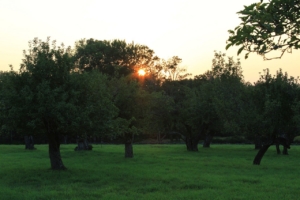⤷ You are here:
🖖︎ Prayers & Praxes —⟶ 🌞︎ Prayers for the Sun, Weekdays, Shabbat, and Season —⟶ Shabbat —⟶ Se'udah haShlishit 🡄 (Previous category) :: 📁 Minḥah l'Shabbat 📁 Motsaei Shabbat :: (Next Category) 🡆 Sorted Chronologically (old to new). Sort most recent first? Psalms 126 in Masoretic Hebrew, with a German translation by Franz Rosenzweig. . . . Categories: Tags: 20th century C.E., 57th century A.M., ברכת המזון birkat hamazon, German Jewry, German translation, Psalms 126, שיר Shir, זמירות zemirot Contributor(s): A paraliturgical translation of Psalms 23 in English, set side-by-side with the Masoretic Hebrew. . . . Categories: Tags: 21st century C.E., 58th century A.M., devotional interpretation, interpretive translation, מזמור Mizmor, Psalms 23 Contributor(s): A song for celebrating the Shabbat. . . . Categories: Tags: Contributor(s): “Roshei am et hitasef umlekhim b’sodam” by Yehuda Halevi was translated by Herman Prins Salomon in “Yehuda Halevi and his ‘Cid’” and published in The American Sepharadi (1978), pp. 22-46. . . . Categories: Tags: Contributor(s): This translation by Rabbi David Aaron de Sola of “Elohim Yisadenu” by a paytan named Avraham (possibly Avraham ibn Ezra) was first published in his Ancient Melodies of the Spanish and Portuguese Jews (1857). . . . A reading from the Zohar providing context for the third meal of Shabbat (the Saturday afternoon meal, se’udah shlishit/shaleshudes). . . . Categories: Tags: Contributor(s): A pizmon and table song sung on Shabbat and on Lag ba-Omer with English translation. . . . A piyyut by the ARI for the afternoon of Shabbat in Aramaic set side-by-side with Reb Zalman’s paraliturgical, devotional translation. . . . The popular piyyut, Yedid Nefesh, in Hebrew with English translation. . . . The mystical piyyut of Avraham Maimin, a student of Moshe Cordovero, translated by Reb Zalman. . . . Categories: Tags: 16th century C.E., 54th century A.M., acrostic, Acrostic signature, אל מסתתר El mistater, פיוטים piyyuṭim, prayers of ḳabbalists, shaleshudes, זמירות zemirot Contributor(s): The mystical piyyut of Avraham Maimin, a student of Moshe Cordovero, translated by Len Fellman. . . . Categories: Tags: acrostic, Acrostic signature, אל מסתתר El mistater, פיוטים piyyuṭim, prayers of ḳabbalists, shaleshudes, זמירות zemirot Contributor(s): “Prinzessin Sabbat” by Heinrich Heine, in Romanzero III: Hebraeische Melodien, (“Princess Shabbat,” in Romanzero III, Hebrew Melodies.), 1851 was translated into English by Margaret Armour (1860-1943), The Works of Heinrich Heine vol. 12: Romancero: Book III, Last Poems (1891). We have replaced “schalet” (unchanged in Armour’s translation) with cholent. . . . Categories: Tags: 19th century C.E., 57th century A.M., Elysium, food, Gashmiut and Ruchniut, German orientalism, German romanticism, לכה דודי Lekhah Dodi, lycanthropy, Ode to Joy, Sabbath Queen, Sardonic poetry, שכינה Shekhinah Contributor(s): The popular table song calling for the redemption of the Messianic age in Tsiyon. . . . Categories: Tags: Contributor(s): This is a vocalized transcription and translation of the World War Ⅱ era song, “Shir haGe’ulah (Song of Redemption)” from the source images shared in A Tribute to Rabbi Mordechai Meir Hakohen Bryski v”g Bryski (Rabbi Mordechai A. Katz, 2017), pp. 19-20. The song is also known by its incipit, “Heḥayyeinu El.” . . . Categories: 🌐 Holocaust Remembrance Day (January 27th), Kristallnacht (9-10 November, 16 Marḥeshvan), 🇮🇱 Yom haShoah (27 Nisan), 🇺🇸 Days of Remembrance of the Victims of the Holocaust, Se'udah haShlishit Tags: 20th century C.E., 58th century A.M., acrostic, חבּ״ד ḤaBaD Lubavitch, משיח Moshiaḥ, the Holocaust, World War Ⅱ, זמירות zemirot Contributor(s): Eli Kevodi (My God, My Glory”), for seudah shelisheet, was composed by Asher Hillel Burstein in 2018. The hymn was awarded the “Rabbi Hershel Matt Creative Liturgy Award,” the first prize in the creative liturgy contest sponsored by ARC (The Association of Rabbis and Cantors), an interdenominational group of Jewish clergy. . . . Categories: Tags: Contributor(s):
Stable Link:
https://opensiddur.org/index.php?cat=3638
Associated Image: 
"Orchard at Sunset" (credit: "Public Domain Pictures", license CC0) (This image is set to automatically show as the "featured image" in shared links on social media.)
Terms of Use:
Be a mentsch (a conscientious, considerate person) and adhere to the following guidelines:
Additional Notes:
Support this work:
The Open Siddur Project is a volunteer-driven, non-profit, non-commercial, non-denominational, non-prescriptive, gratis & libre Open Access archive of contemplative praxes, liturgical readings, and Jewish prayer literature (historic and contemporary, familiar and obscure) composed in every era, region, and language Jews have ever prayed. Our goal is to provide a platform for sharing open-source resources, tools, and content for individuals and communities crafting their own prayerbook (siddur). Through this we hope to empower personal autonomy, preserve customs, and foster creativity in religious culture.
ויהי נעם אדני אלהינו עלינו ומעשה ידינו כוננה עלינו ומעשה ידינו כוננהו "May the pleasantness of אדֹני our elo’ah be upon us; may our handiwork be established for us — our handiwork, may it be established." –Psalms 90:17
| ||
Sign up for a summary of new resources shared by contributors each week
  |
